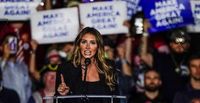In the midst of a mounting legal and administrative crisis, the question of who is the legitimate U.S. Attorney for New Jersey remains unsettled, casting a shadow over federal prosecutions in the state. The controversy centers on Alina Habba, a former lawyer for former President Donald Trump, who has been appointed and reappointed as acting U.S. Attorney under a cloud of legal uncertainty.
The turmoil escalated after The New York Times reported that multiple court proceedings, including the convening of a new grand jury, were canceled in New Jersey federal courts on Monday, July 28, 2025. This disruption followed Habba’s reappointment after an initial 120-day interim stint. A court filing on Wednesday, July 30, 2025, signed by Attorney General Pam Bondi and other senior Justice Department officials, confirmed that Habba is currently performing the duties of U.S. Attorney. However, her authority is being challenged by defendants in an upcoming trial scheduled for August 4, 2025, who have filed motions to dismiss indictments on the grounds that Habba’s appointment is unlawful.
The Department of Justice (DOJ) argues in its brief that Habba is “validly serving as the Acting U.S. Attorney” based on a sequence of events: Bondi appointed her as first assistant U.S. Attorney, a position that under the Federal Vacancies Reform Act (FVRA) allows her to serve as acting U.S. Attorney when the office is vacant, and the President properly removed Desiree Grace, the judges’ appointee who had briefly held the post. DOJ supports its position with a trove of documents, including two orders from Bondi appointing and extending Habba’s term, a July 22 letter firing Grace, and a July 24 resignation letter from Habba as Interim U.S. Attorney stating her intent to continue leading the office.
Additional documents include a July 24 order appointing Habba as a special attorney and designating her first assistant U.S. Attorney, a hiring letter authorizing her to conduct legal proceedings in New Jersey, and communications from presidential personnel and DOJ officials informing Grace that her judges’ appointment lacked authority and that the President had removed her.
Despite these efforts, the FVRA still poses significant hurdles. The statute restricts acting service for Senate-confirmed positions to individuals who have been first assistant for at least 90 days or whose nomination is pending before the Senate. Habba’s nomination, submitted by Trump on June 30, 2025, was withdrawn on July 24, 2025, complicating her legal standing. Some legal scholars, including Georgetown Law professor Steve Vladeck, argue that the mere submission of her nomination, even if later withdrawn, should disqualify her from acting service under the FVRA.
In response, the DOJ has advanced a fallback argument: even if Habba is not technically acting U.S. Attorney under the FVRA, the Attorney General has the statutory authority to delegate the powers of a U.S. Attorney to any DOJ officer or specially appointed attorney. This delegation, they say, allows Habba to exercise prosecutorial powers regardless of her official title. A government filing bluntly states, “at bottom, this is a dispute over titles, not authority.” The July 30 brief emphasizes, “Whether or not Ms. Habba technically qualifies as Acting United States Attorney, the Attorney General has validly delegated to her the authority to supervise all pending prosecutions.”
This legal wrangling has profound practical consequences. When Habba’s 120-day interim appointment expired the week of July 21, 2025, New Jersey’s federal judges exercised their statutory power to appoint Desiree Grace, Habba’s own appointee as first assistant, as temporary U.S. Attorney. President Trump swiftly fired Grace, enabling Habba to resign and then assume the first assistant role, which under the DOJ’s interpretation automatically made her acting U.S. Attorney.
However, this sequence has not quelled the controversy. An attorney representing a criminal defendant challenged Habba’s legitimacy, leading to a halt in many federal criminal cases across New Jersey. Joshua Gillette, president of the Association of Criminal Defense Lawyers of New Jersey, expressed concern in a July 30 letter seeking to join the case as amicus curiae. He warned that the government’s stance effectively grants Habba “unfettered power to continue to ‘supervise’ every single one of the hundreds of cases pending in the United States Attorney’s Office for the District of New Jersey,” even if her appointment is invalid under the Constitution or federal statutes.
The dispute is not isolated to New Jersey. Similar controversies over U.S. attorney appointments have arisen in New York, California, and Nevada, signaling a broader challenge to the traditional independence and legal norms governing these critical prosecutorial offices.
Attorney General Pam Bondi’s rhetoric has further inflamed tensions. Upon firing Grace, Bondi declared, “This Department of Justice does not tolerate rogue judges — especially when they threaten the President’s core Article II powers.” Yet, legal experts and observers have noted that the judges’ actions were well within their statutory authority and reflect the fundamental principle of separation of powers. The law explicitly grants District Court judges the power to appoint a temporary U.S. Attorney if no one has been confirmed after the interim appointment expires — a power briefly removed nearly two decades ago but restored following the George W. Bush administration’s controversial firing of U.S. attorneys.
The Justice Department’s current posture marks a significant shift from the post-Watergate era, where U.S. Attorney’s Offices operated with considerable independence. Now, the Attorney General openly asserts the ability to displace any U.S. Attorney’s Office through the appointment of special attorneys, circumventing traditional Senate confirmation processes. This evolution raises questions about the balance of power within the federal justice system and the potential politicization of prosecutorial authority.
Meanwhile, New Jersey’s criminal defense community is actively seeking a role in the ongoing federal case challenging Habba’s legitimacy. The matter has become a focal point amid the continuing crisis in the federal courts, as defendants challenge the validity of prosecutions overseen by Habba.
With the dispute poised to reach the Supreme Court, its outcome will have lasting implications for the appointment and authority of U.S. Attorneys nationwide. As the legal battle unfolds, federal prosecutions in New Jersey remain in limbo, highlighting the real-world consequences of this high-stakes constitutional and administrative conflict.


